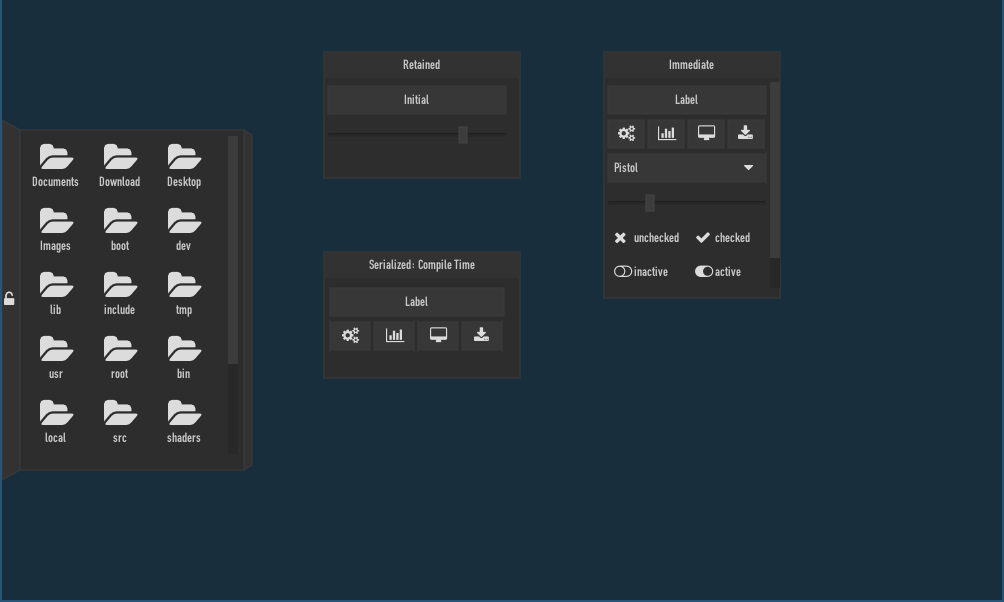The Gilbert–Johnson–Keerthi (GJK) distance algorithm is a method of determining the minimum distance between two convex sets. The algorithm's stability, speed which operates in near-constant time, and small storage footprint make it popular for realtime collision detection.
Unlike many other distance algorithms, it has no requirments on geometry data to be stored in any specific format, but instead relies solely on a support function to iteratively generate closer simplices to the correct answer using the Minkowski sum (CSO) of two convex shapes.
This file contains hidden or bidirectional Unicode text that may be interpreted or compiled differently than what appears below. To review, open the file in an editor that reveals hidden Unicode characters.
Learn more about bidirectional Unicode characters
| #include <stdio.h> | |
| #include <limits.h> | |
| #include <float.h> | |
| #include <stdlib.h> | |
| #include <string.h> | |
| #include <assert.h> | |
| #include <stdint.h> | |
| #include <stdarg.h> | |
| /* --------------------------------------------------------------------------- |
This file contains hidden or bidirectional Unicode text that may be interpreted or compiled differently than what appears below. To review, open the file in an editor that reveals hidden Unicode characters.
Learn more about bidirectional Unicode characters
| #include <stdio.h> | |
| #include <stdarg.h> | |
| #include <string.h> | |
| #include <stdint.h> | |
| #include <stdlib.h> | |
| #include <assert.h> | |
| #include <limits.h> | |
| #include <ctype.h> | |
| /* --------------------------------------------------------------------------- |
This file contains hidden or bidirectional Unicode text that may be interpreted or compiled differently than what appears below. To review, open the file in an editor that reveals hidden Unicode characters.
Learn more about bidirectional Unicode characters
| #include <stdio.h> | |
| #include <stdarg.h> | |
| #include <string.h> | |
| #include <stdint.h> | |
| #include <stdlib.h> | |
| #include <assert.h> | |
| #include <limits.h> | |
| /* --------------------------------------------------------------------------- | |
| * ARG |
This file contains hidden or bidirectional Unicode text that may be interpreted or compiled differently than what appears below. To review, open the file in an editor that reveals hidden Unicode characters.
Learn more about bidirectional Unicode characters
| #if 0 | |
| static void | |
| usage(const char *app) | |
| { | |
| panic("\n" | |
| "usage: %s [options]\n" | |
| "\n" | |
| " options:\n" | |
| "\n" |
This file contains hidden or bidirectional Unicode text that may be interpreted or compiled differently than what appears below. To review, open the file in an editor that reveals hidden Unicode characters.
Learn more about bidirectional Unicode characters
| #define LIB_DEBUG 2 | |
| #if defined(LIB_DEBUG) && (LIB_DEBUG >= 2) | |
| #include <stdio.h> | |
| #define DEBUG_LOG(l, ...) \ | |
| if (l <= LIB_DEBUG) { \ | |
| fprintf(stderr, "%s(L:%d):, __FILE__, __LINE__); \ | |
| fprintf(stderr, __VA_ARGS__); \ | |
| fprintf(stderr, " \n"); \ | |
| } | |
| #else |
This file contains hidden or bidirectional Unicode text that may be interpreted or compiled differently than what appears below. To review, open the file in an editor that reveals hidden Unicode characters.
Learn more about bidirectional Unicode characters
| struct path_iter { | |
| const char *begin; | |
| const char *end; | |
| /* internal */ | |
| const char *next; | |
| const char *eof; | |
| }; | |
| static void | |
| path_begin(struct path_iter *it, const char *str, const char *end) | |
| { |
This file contains hidden or bidirectional Unicode text that may be interpreted or compiled differently than what appears below. To review, open the file in an editor that reveals hidden Unicode characters.
Learn more about bidirectional Unicode characters
| #if 0 | |
| #include <stdio.h> | |
| int main(void) | |
| { | |
| int n, t[3] = {0}; | |
| for (n = 0; n < 100; ++n) { | |
| pytriples(t); | |
| printf("(%d,%d,%d)\n", t[0], t[1], t[2]); | |
| } return 0; |
This file contains hidden or bidirectional Unicode text that may be interpreted or compiled differently than what appears below. To review, open the file in an editor that reveals hidden Unicode characters.
Learn more about bidirectional Unicode characters
| #include <stdio.h> | |
| #include <stdlib.h> | |
| #if defined(__clang__) || defined(__GNUC__) | |
| #define sort qsort_r | |
| #define SORT_COMPARE(name) int name(const void *a, const void *b, void *arg) | |
| typedef SORT_COMPARE(sort_cmp_f); | |
| #elif defined(_MSC_VER) | |
| #define sort qsort_s | |
| #define SORT_COMPARE(name) int name(void *arg, const void *a, const void *b) |
